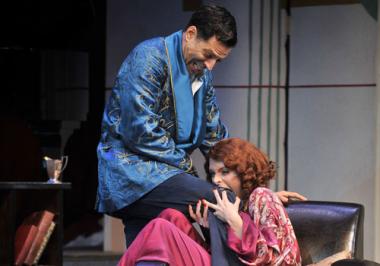By coincidence, both Pittsfield's Barrington Stage Company and the Berkshire Theatre Festival in Stockbridge are currently running plays by that epitome of urbane wit and sexual skirmishing, Noel Coward. Both productions are attired in smoking jackets and evening gowns, studded with glittering repartee and littered with lies, deceptions and self-deceptions.
Barrington's offering is a near-perfect rendition of Coward's 1930 masterpiece Private Lives. Noel Coward in Two Keys, at BTF, is a pair of one-acts from 1966, his second-to-last play. It is one-half trivial and one-half astounding.
Private Lives is classic Coward—a battle of the sexes that tweaks conventional manners and mores. Elyot and Amanda had a brief, tempestuous marriage in which they fought even more passionately than they loved. They've both just remarried, and by coincidence are occupying adjacent honeymoon suites in a French seaside hotel. After the shock of recognition, the old flame rekindles and they escape to a Paris love nest.
The rest of the play is a see-saw reprise of their stormy relationship—jealous spats resolving into make-up kisses which soon give way to bickering that crescendos into one of the most hilariously spectacular knock-down drag-out fights in stage history. At which point, the jilted spouses appear and the play heads toward its satisfyingly inevitable conclusion.
In Julianne Boyd's production, Coward's crackling pace and crisp dialogue are captured perfectly by a well-matched quartet of actors—plus Tandy Cronin in a droll, French-only cameo as a grumpy maid. Gretchen Egolf sets the pace as Amanda. Tall and Hepburn-lanky, she can spit venom, then purr like a well-tupped tigress. Christopher Innvar, a Barrington regular, matches her splendidly as Elyot, his debonair elegance crumbling into apoplexy as the rows escalate. Mark H. Dold and Rebecca Brooksher more than hold their own as the odd couple out—he all stuffed-shirt outrage, she all girlish pouts.
Gay in a Way
Both plays that make up Noel Coward in Two Keys involve couples whose stable, expedient marital arrangements are upended by the arrival of another woman. Both are set in a luxurious Swiss hotel—R. Michael Miller's cream-and-white set just rearranges the furniture to suggest two identical rooms—with the same obsequiously correct waiter (Gian Murray Gianino) appearing in both.
The double bill is expertly directed by Vivian Matalon, who also staged the original 1966 production starring Coward himself, as well as a 1974 Broadway revival. Three actors play the other six roles, giving nicely contrasting character sketches. That show of versatility is one of the pleasures of double bills, for actors and audience alike. But inherent in a one-act is the risk that it will come off as half a play, and that's the case with the curtain-raiser, Come into the Garden, Maud.
In it, a world-weary American tycoon with a shrill, social-climbing wife falls for a penniless Italian princess and runs away with her. Whereas the impetuous elopement in Private Lives is the springboard for that plot, that's all there is to this one. It's entertaining, spiced with Mia Dillon's enjoyable performance as the excruciating wife, but it's really just an hors-d'oeuvre for the evening's main course.
Noel Coward was a world celebrity in an era when homosexuality was barely recognized, much less tolerated. He never denied he was gay, but never confessed to it either. In his plays, though, he pioneered the kind of irreverent flippancy we now call camp. A Song at Twilight was his only work to explicitly address homosexuality.
Sir Hugo Latymer (Casey Biggs) is an eminent author (modeled on Somerset Maugham), a man supremely confident and proud of his station in the world. In his memoirs, he has paraded an affair with Carlotta Gray (Maureen Anderton), a minor movie star he characterized in the book as "mediocre." Now, after many years, she turns up with a forthcoming memoir of her own, in which she wants to print the love letters he wrote to her. When he angrily refuses, she plays a vindictive trump card. She has another collection of love letters, the ones he wrote to a male lover.
This was pretty strong stuff in 1966, and out of character for the master of dry-martini wit. The play turns from edgy banter to compelling drama, as Sir Hugo faces the prospect of public humiliation and professional ruin. The confrontation circles around questions of ethics and honesty, but I was fascinated by one small detail.
Hugo's gay lover, we are told, died of leukemia complicated by hepatitis, and in his last days "he simply wasted away." This is clearly a description of AIDS, written before anybody knew what AIDS was. I can only imagine that Coward had seen this happen to friends and prophetically recognized what in the next 10 years would become a plague.
Private Lives plays through Aug. 24 at Barrington Stage Company, 30 Union Street, Pittsfield, (413) 236-8888. Noel Coward in Two Keys runs through Aug. 30 at Berkshire Theatre Festival, Stockbridge, (413) 298-5576.



